Inflamed (Enlarged) Taste Buds
Foods. They keep us alive. They make us happy. They satisfy the cravings of our taste buds.
Have you ever wondered what happens if you cannot taste every food that you ingest? That would be undelightful and it will be such a waste because eating tasty foods is like heaven on earth. But what is it that makes us enjoy every food that we take? It is the taste buds on our tongue.
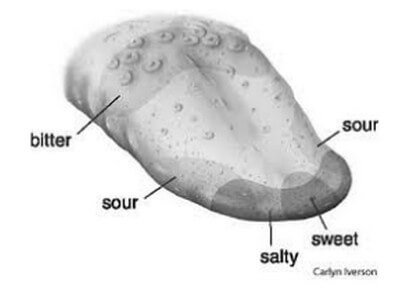
Picture 1 : Which part of the tongue perceives what.
Source: fitnessbeyondborders.org
There are different kinds of taste. Primary ones are sweet, salty, sour, bitter, and umami. Other kinds of taste are combinations of these. The tip of the tongue is responsible for sweet and salty flavors of food. The sides are sensitive for sour and the back of the tongue is for bitter taste [1].
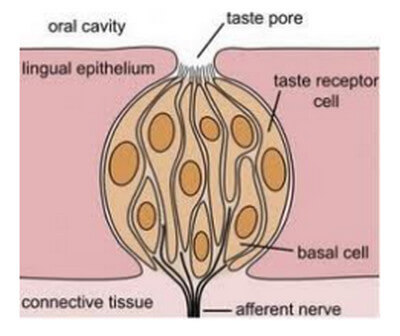
Picture 2 : Taste Bud
Source: fitbuff.com
How do we taste our food? When food is taken into our mouth, it mixes with saliva which aids in mastication or the act of chewing. The teeth grind the food with the help of the tongue. As the food is mechanically broken down, its chemical substances are being detected by receptor taste cells through the taste pores [1]. The receptors will then be stimulated by its presence and this sends out impulses through the nerves into the brain. The brain interprets what the food tastes like.
What happens then if your taste buds become infected or inflamed (swollen, enlarged) ?
Taste pores become blocked and receptor taste cells will not be able to perceive the flavour that it is supposed to receive. There will be no or little impulse that goes to your brain. As a result, you will taste little to nothing.
That is why we have to take care of our oral cavity as a whole. If you enjoy eating your food that much, you also have to enjoy taking care of your tongue by making sure your taste buds don’t get inflamed.
Causes of Swollen (Inflamed) taste buds
- Hot stuff: Foods and drinks with very high temperature and spicy taste might burn the taste buds and this causes inflammation. All of us have tried this at least once in our lives. You notice the effect immediately when you drink a very hot coffee, for example.
- Tobacco, Alcohol, Insecticides: These contain strong chemical substances that irritate the nerves of the tongue.
- Oral Thrush and Infection: Presence of any kinds of infection in the mouth causes the mucus membranes to be irritated. This increases the likelihood of developing infected taste buds especially if the affected area is the tongue.
- Physical Trauma or Injury to the Tongue: Cuts, lacerations, burns, and the like visibly damages the tissue and this causes the taste buds to be less efficient than it should be.
- Allergy: Presence of allergy triggered by foods increases white blood cells particularly eosinophils which causes inflammation.
- Chemotherapy and Radiation Therapy: One of the adverse effects of chemotherapy and radiation therapy for cancer patients is damaging of the mucous membranes. These forms of rigorous therapy attack cells that multiply rapidly, even the normal ones. Since mucous membranes are one of these fast-dividing cells, they are being attacked, thus, they become fragile. The whole oral cavity is being affected.
- Vitamin Deficiencies: Vitamins B complex and C are responsible in maintaining healthy oral cavity. Deficiency in these vitamins may lead to development of swollen tongue such as that seen in scurvy or vitamin C deficiency.
- Carcinoma: The cancer cells destroy the normal cells of the tongue including that of the papillae or taste buds.
- Strong Mouthwash: Mouth products that have too much chemical in them inflame the mucous membranes.
- Vigorous Tongue Brushing: This grossly and deliberately destroys the taste buds.
- Acid Reflux: Regurgitated acid from the stomach is too strong for the mouth to handle. If a certain amount is perceived by the tongue, this irritates the taste buds thereby causing swelling.
- Medications: Some drugs cause distortion of taste [2, 3, 4, 5, 6].
Taste buds are very small fingerlike structures that protrude over your tongue. It causes discomfort if you notice them to be enlarged or swollen. Presence of infection adds up to the problem. Taste buds are inflamed if they are painful, pale, reddened, enlarged, and have some loss of function [4].
Here are some photos to see you have inflamed or swollen taste buds:
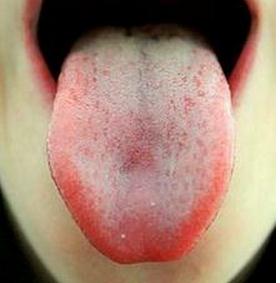
Picture 4: Infected Taste Bud
Image Source: healthsurgical.com
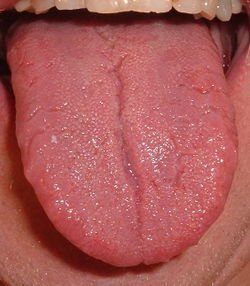
Picture 5: Inflamed Taste Bud during pregnancy
Image Source: medical-base.com
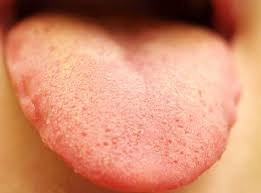
Picture 6: Enlarged Taste Bud
Image Source: lifestylescans.com
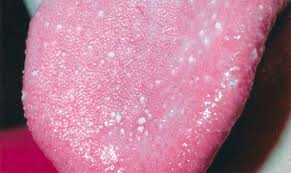
Picture 7: Inflammed Taste Bud (canker sore)
Image Source: scienceline.com
Home Remedies for Inflamed Taste Buds
- Ice: This relieves the swelling. Gently press it against your tongue. Don’t press it too hard or let it stay for too long. This will restrict blood flow into your tongue which may cause a bigger problem.
- Warm Salt Solution: Dissolve one teaspoon of salt into a lukewarm water and use it for gargling thrice a day. This effectively relieves the inflammation by enhancing blood flow to the mouth. Some believe that hot water must be used to kill the bacteria. This is not acceptable. Have mercy to your tongue. Only use water that is tolerable for you.
- Baking Soda: Apply it directly to the affected area. This cools the tongue down, thereby relieving the swelling. Additionally, this is a basic substance. If the cause of your enlarged tongue is acid reflux from your stomach, use this to counter its effect.
- Glycerin: This heals the inflamed tongue caused by physical injury or trauma and mouth sores.
- Honey: This is an antibacterial agent. Swishing, rinsing or actually drinking honey cleanses your mouth. Use this if the infected tongue is caused by bacteria.
- Garlic, Ginger, and Pepper: Make a decoction out of these three and drink it four times a day. Use this if the infected tongue is caused by bacteria.
- Tea Tree Oil: Drop it to warm water and use it for gargling. Use this if the infected tongue is caused by bacteria. However, this is not widely recommended because too much drops may cause hallucination. This now presents a bigger problem than your enlarged tongue!
Medical Treatment
Infected tongue caused by bacteria, virus, or fungi, should be treated with antibiotics, antivirals, or antifungals. Do not experiment with whatever drugs that you think could heal you. It is always better to let your doctor do the prescription.
Enlarged tongue that is suspected to be linked to any kind of malignancies should be reported to the doctor immediately [3].
Taking in vitamins B and C supplements may solve your problem if the cause is nutritional deficiency.
If any of the recommendations do not work for you, you better consult your doctor [4].
Prevention of enlarged Taste Bud
It’s easy. Say no to all of the causes mentioned above except for the medications and therapies because its benefits still outweigh the risks.
Always take care of your tongue. Keep it clean. You want your food to give you heaven’s delight, right?
Also see : Fissured Tongue – Pictures, Causes, Features and Cure and Why is my tongue itchy and how to get rid of ?
References
- Eroschenko VP, DiFiore’s Atlas of Histology with Clinical Correlations 11th edition, Lippincott Williams & Wilkins 2008, p 240
- http://www.med-health.net/Inflamed-Taste-Bud.html
- http://www.buzzle.com/articles/inflamed-taste-buds.html
- http://www.healthsurgical.com/2013/05/swollen-taste-buds-symptoms-causes-treatment.html
- http://www.yogawiz.com/blog/home-remedies/papillae-inflamed-taste-buds-on-tongue.html
- http://www.healthmedicinelab.com/inflamed-taste-bud/
Published by Dr. Raj MD under Diseases and Conditions.
Article was last reviewed on August 6th, 2018.

